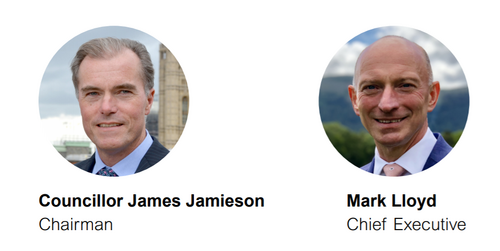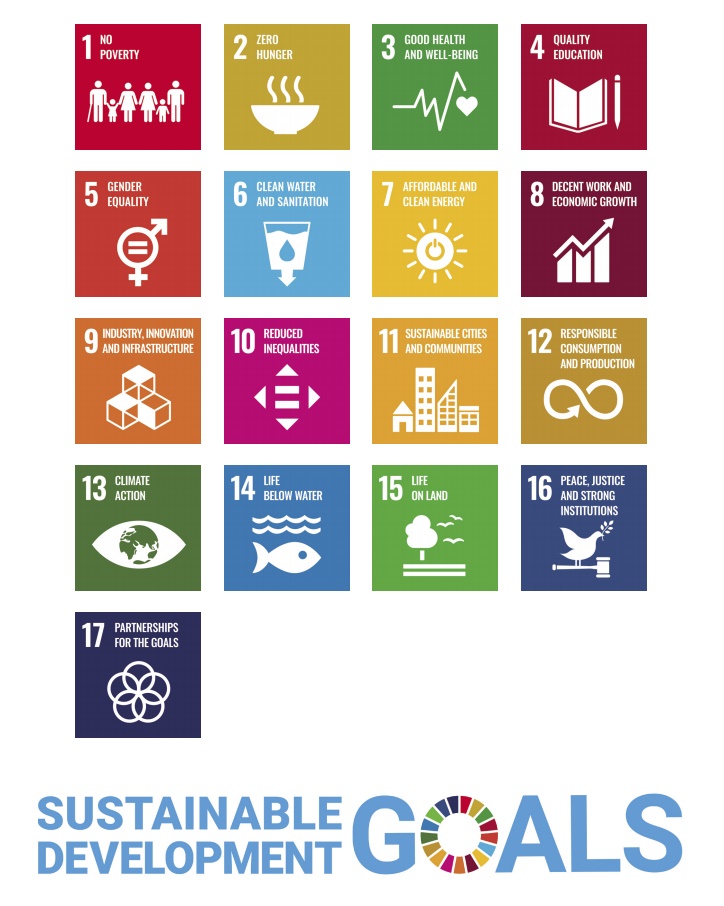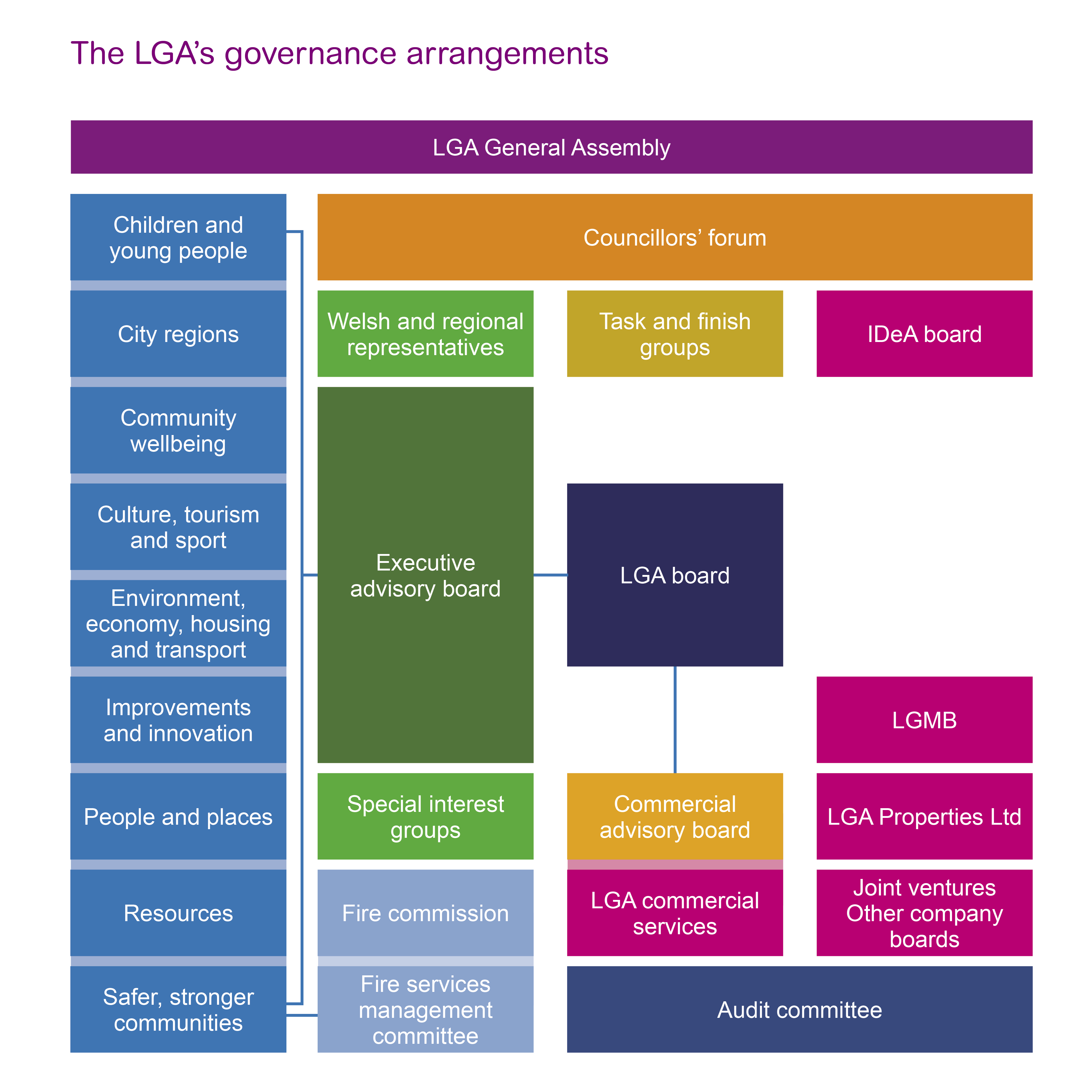The pandemic has changed the way that organisations across the world and across all sectors work. We are committed to providing the best and most cost-effective services to councils and councillors in England and Wales. We are politically led, committed to equality, diversity and inclusion and we aim to operate in an environmentally and financially sustainable way.
The national membership body for local government – we will:
- maintain membership levels amongst local authorities in England and Wales by continuing to offer membership benefits that meet councils’ changing needs and expectations
- deliver first class communications that are highly valued and respected by our member councils and that influence the issues that matter to them, their residents and their communities
- offer a range of flexible options for councils to participate actively in our work, including through an extensive programme of virtual and hybrid events and meetings
- seek to improve and extend our support offer to councils in the priority areas they find most helpful through partnership arrangements and funding opportunities
- use the full potential of our CRM system to enhance the delivery of integrated and targeted services to our member councils
- launch a new online membership resource, setting out the benefits of membership with councils and councillors
- support council legal teams on strategic governance and constitutional issues
- pursue additional sources of funding that are consistent with our priorities to enhance our support to councils.
A politically-led organisation – we will:
- ensure our political governance arrangements continue to reflect and respond to the priorities and the expectations of our membership
- provide the members who sit on our boards, committees, working groups and forums with the training, briefings and information they need to deliver their roles on behalf of local government
- offer political support to individual councillors and council administrations through our political group offices
- provide briefings and advice on local government issues to our president and parliamentary vice-presidents
- engage with parliamentary proceedings to ensure that local government’s priorities are recognised in debates and committee reports.
Financially sustainable – we will:
- continue to develop existing and new income-generation opportunities in order to diversify our sources of funding and support our long-term financial sustainability
- complete the refurbishment of Layden House in Farringdon to increase its capital value and maximise our income from commercial letting of the office floors and retail units
- review options to maximise income from 18 Smith Square and rebuild the commercial venue programme through a combination of active marketing, targeted communications and excellent, responsive customer service
- keep under review patterns of use of 18 Smith Square in the light of increased flexible and hybrid working and other changes to determine our optimum long term office requirements
- deliver cost effective back-office support services such as HR, payroll, finance and secretariat support to our joint ventures and third-party organisations, including the UK Municipal Bonds Agency
- invest responsibly and seek to ensure that our contractors, joint ventures and pension funds have in place investment policies that further our objectives and values
- complete the transfer of IDeA pensions administration from Camden to Merseyside scheme.
Efficient business management – we will:
- continue to streamline our company structures to deliver a solid and tax-efficient base from which to run our business, including the transfer of 18 Smith Square to the LGA and the winding up of LGA (Properties)
- drive best value from our major contracts in the light of post-COVID ways of working, including the re-procurement of our Total Facilities Management and room bookings contracts and renegotiation of the catering contract
- implement our new finance, HR and payroll systems to include greater levels of self-service
- continue to develop our ICT in partnership with our providers, Brent/Shared Technology Services to deliver continuous improvements in efficiency, flexibility and cyber security
- maximise the use of the improved videoconferencing capability in all 18 Smith Square meeting rooms to increase their commercial potential and support a culture of flexible and hybrid working for employees and members.
Supportive people management – we will:
- develop and launch a people plan/strategy
- embed equality, diversity and inclusion into our core values, our policies and our practices, supporting and developing our staff networks to ensure that the lived experience of our staff helps shape our organisation and the work we deliver for our members
- re-frame our leadership development offer for current and aspiring managers as part of our wider commitment to develop our staff, including virtual and hybrid options to allow everyone to participate
- refresh our values and behaviours and ensure that they are central to the way that we do things
- evolve and deliver our staff health and wellbeing strategy, monitoring feedback through our regular ‘temperature check’ surveys
- develop policies that support LGA staff to deliver their best and reflect our new more flexible working practices
- review and redefine the role of our corporate leadership team.
Collective legal action – we will:
- support groups of councils to mount collective legal actions or fight actions against them where we believe that they have a strong case, commissioning expert legal advice and sources of funding where appropriate
- collate and prepare responses and New Burdens submissions on behalf of the sector where new policies, legislation or regulations result in additional duties or costs to councils
- provide legal advice on strategic issues with sector wide implications, including commissioning expert legal advice where appropriate.
Committed to a sustainable future – we will:
- in line with the motions passed by the 2019 and 2021 General Assemblies, keep action to tackle climate change at the heart of the way that we manage our business, modelling best practice, reducing carbon emissions under our direct control and influencing partner organisations to do the same
- keep our policies and practices under review to ensure that they contribute to combatting the adverse effects of climate change
- calculate our own greenhouse gas emissions through our greenhouse gas accounting tool to inform our area of focus for the next business plan
- encourage sustainable travel practices through our enhanced flexible working policy and practices, staff and members’ expenses policies and continued participation in national sustainable travel initiatives including the Cycle to Work scheme
- minimise the environmental impact of our two central London buildings and the way that we use and manage those buildings, including ensuring that our facilities management and catering contractors have environmentally sustainable policies and practices.
Our service delivery partnerships
Local Partnerships
Local Partnerships is a joint venture between the LGA and HM Treasury, formed in 2009 to help the public sector deliver local services and infrastructure. It offers support to local authorities in the following areas:
- developing and reviewing strategic business cases and business plans
- service transformation and change
- modelling and legal frameworks for alternative service delivery models
- options appraisal and assurance of chosen approaches or options
- forming effective partnerships (inter-agency brokerage)
- sourcing and commissioning, contract negotiation and management
- economic development and planning
- delivering infrastructure.
GeoPlace
GeoPlace LLP is a joint venture between the LGA and Ordnance Survey and the central source for UK addresses and streets data. Working in close collaboration with the 339 councils in England and Wales, GeoPlace cleanses and validates the data they produce and creates and maintains national registers, called gazetteers − a central hub of 42.8 million addresses and 1.3 million streets.
The result is a single, unified source for all addressing and street data, which helps to keep public services running smoothly, join services together, and find new efficiencies. Its uses range from next-day deliveries of online shopping, to street works, blue light services, meter readings, taxi journeys and policy-making.
The data is distributed commercially by Ordnance Survey through the AddressBase range of products.
Public Sector Audit Appointments (PSAA)
PSAA is an independent company limited by guarantee incorporated by the LGA in August 2014. The Secretary of State for DLUHC has specified PSAA as an appointing person under the provisions of the Local Audit and Accountability Act 2014. PSAA appoints an auditor to relevant local government bodies that opt into its national scheme and sets a scale of fees for the work which auditors undertake.
UK Municipal Bonds Agency plc (UKMBA)
The LGA is a major shareholder in the local government-owned UKMBA, which delivers cheaper debt financing to councils, through the sale of bonds in the capital markets. We support and provide client side services to the Agency, as it works through its managed service provider to aggregate borrowing requirements and issue bonds.
Minimising the impacts of climate change
The LGA is committed to minimising the environmental impacts of its activities, reducing greenhouse gas emissions, increasing biodiversity and adapting to climate change in order to contribute to a healthy future for all. These are some of the ways that we deliver on that commitment.
Flexible working
Our flexible working policy allows staff to balance working from home with time spent in the office, subject to the needs of the business. This means less journeys to work, a better work-life balance for our staff and their families and less dependence on valuable central London office space.
Our ICT is designed to support flexible working without compromising data security, enabling staff safely to log into their LGA accounts from home, from other locations or when they are on the move.
18 Smith Square
Since its refurbishment in 2017/18, 18 Smith Square has received an energy rating B under the government’s energy performance scheme for non-domestic buildings. This compares with an average D rating for other comparable buildings and is a significant achievement for a heritage building in a conservation area.
All lights in the building are energy efficient LEDs, with motion sensors that ensure they are switched off when not needed. Windows on the south and west of the building which are not part of the conservation area are double glazed to reduce energy loss. Recycling bins are provided on every floor.
Secure cycle facilities and showers are provided in the basement of 18 Smith Square for those who prefer to cycle or run to work.
Meetings
All meeting rooms at 18 Smith Square have access to video conferencing facilities which support virtual and hybrid meetings and events of all sizes. This enables members and staff to join and participate in meetings remotely, reducing the need for lengthy journeys to Westminster.
Travel
Our expenses policy encourages staff to use public transport wherever practicable to help reduce the impact of the LGA’s business travel arrangements on the environment. The Members’ Scheme of Allowance stresses that wherever possible, councillors are expected to travel by public transport when on LGA business.
Procurement
The LGA has a robust, paper free procurement policy and process, which underpin the importance of all our contractors being able to demonstrate a commitment to sustainability and combatting climate change. Our procurement documentation states
‘In adhering to our commitments, the contractor should have systems in place to account for and minimise environmental impacts in all areas of contract delivery’.
Investments
The LGA’s Treasury Policy was updated in March 2021 to include the fundamental principle that, as long as the security of our funds is maintained and that counterparties have sufficient credit ratings, where possible and available our investments should support environmental, social and corporate governance initiatives.








